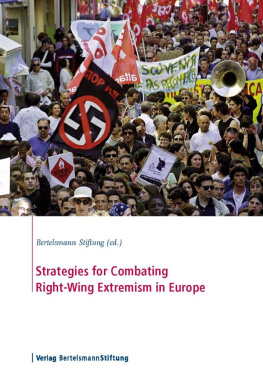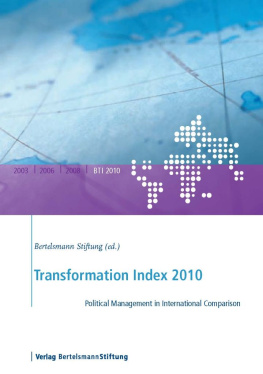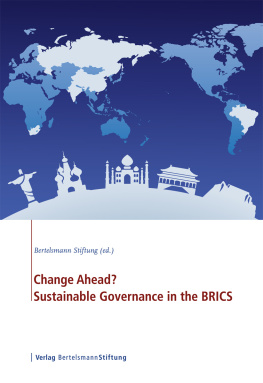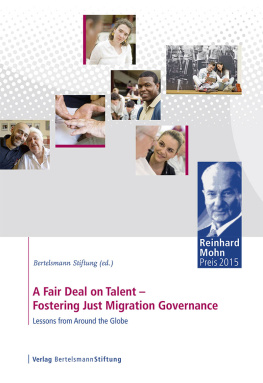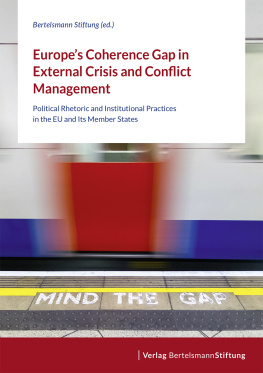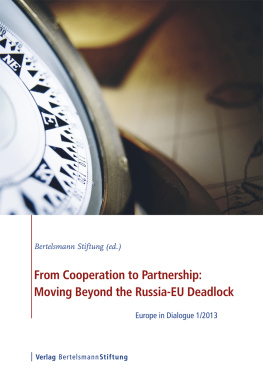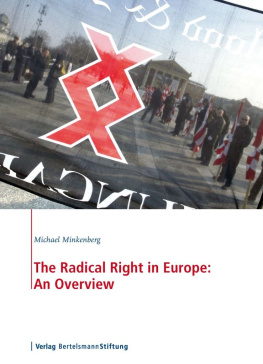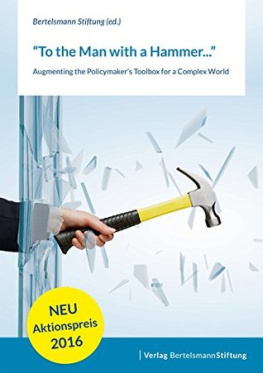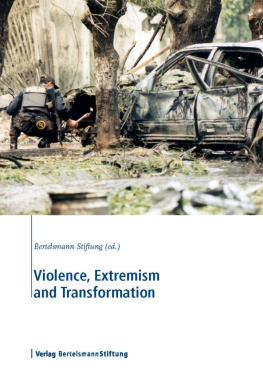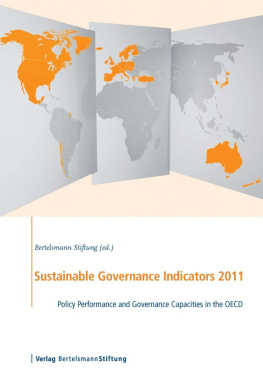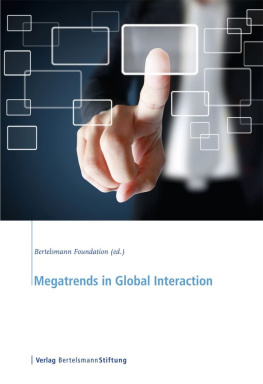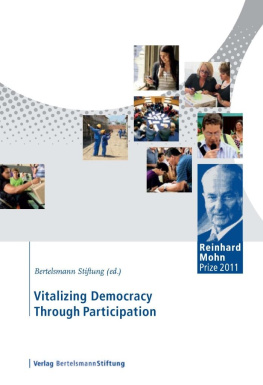Bibliographic information published by the Deutsche Nationalbibliothek
The Deutsche Nationalbibliothek lists this publication in the
Deutsche Nationalbibliografie; detailed bibliographic data
is available on the Internet at http://dnb.d-nb.de.
2010 E-Book-Ausgabe (EPUB)
Responsible: Dr. Orkan Ksemen, Britta Schellenberg
Production editor: Christiane Raffel
Cover design: Nadine Humann
Cover illustration: picture-alliance/dpa/dpaweb
Typesetting: pagina GmbH, Tbingen
Printing: Hans Kock Buch- und Offsetdruck GmbH, Bielefeld
ISBN : 978-3-86793-260-8
www.bertelsmann-stiftung.org/publications
www.bertelsmann-stiftung.de/verlag
Foreword
Johannes Meier
The Canadian city of Toronto has a striking motto: Diversity Is Our Strength. This attitude is indicative of the way communities with a long history of immigration view diversity. Yet the motto is anything but common; in fact, it is remarkable. Due to the rapid changes that have accompanied large movements of people across borders in our lifetime, many countries with substantial levels of immigration are experiencing significant social tensions. Integration is not easy or automatic; it is a gradual process that requires financial and social investments, which tend to produce long-term returns that are not immediately tangible. In his essay E Pluribus Unum: Diversity and Community in the 21st Century, American social scientist Robert D. Putnam presents important research showing how large-scale increases in diversity within communities can initially have a negative impact on social cohesion. According to Putnam, when large numbers of people enter a community to settle within it, a new sense of community has to be generated in order for that immigration to have a positive long-term impact upon the society. A new social climate has to be established in which newcomers are not seen as a social threat and are, instead, given a fair chance to become full members of the society they have joined. Achieving a new climate is arduous-even for countries that have promoted the social inclusion of newcomers over a relatively long period.
Europe has a long history of emigration to the New World and other parts of the globe, and it was only in recent decades that it became a continent of integration. The accompanying transformation in the collective consciousness of Europeans has not yet fully taken hold across the old Continent. On the contrary, in many parts of Europe, a backlash has been seen against globalization, social change and, especially, immigration. In many European countries, social forces have emerged that seek to mobilize the population to oppose immigration and the kind of profound social changes it entails. This sentiment is often exploited by far-right populists who are hostile to diversity and promote the myth of a homogeneous society as the only possible basis for social harmony and cohesion. Far-right populist political movements propagate this myth, as do right-wing extremists and the radical right. Under the cloak of right-wing populist movements, anti-Semitism, racism and fascism are re-emerging and growing stronger to the point that they pose a real threat to pluralistic democracies in Europe.
Europe must address and oppose the threat of right-wing extremism. If it does not, issues such as diversity and immigration will polarize European societies and will, indeed, weaken their social cohesion. The Bertelsmann Stiftung wants to make a contribution to combating right-wing extremism in Europe. It has been working to oppose right-wing extremism since the beginning of the 1990s, when it initiated a number of projects promoting democracy, tolerance and solidarity. The Foundations activities were a response to increased rates of violence against foreigners in Germany following the countrys reunification. The Foundation implemented so-called Betzavta training programs, which originated in Israel, were modified in the United States and have been further developed by trainers for use in schools and as part of extracurricular activities. These programs have proven very effective at promoting tolerance and improving social cohesion among participants, who further disseminate their learning within their communities. Additionally, the Foundations project entitled Strategies for Combating Right-Wing Extremism in Germany explored the role of the media, schools and early-childhood care in mobilizing democratic societies against right-wing extremism. This project ended in 2006 and has been followed by the Foundations current project, which is called Strategies for Combating Right-Wing Extremism in Europe. With this new project, we have broadened our focus beyond Germany to include the whole of Europe. The Foundations current project addresses key questions, such as: What is the situation concerning right-wing extremism like in other European countries? What strategies can European governments learn from the policies of their neighbors to combat right-wing extremism? What strategies are particularly effective, and which of these may be transferable to the German context?
I would like to thank Ulrich Kober and Orkan Ksemen from the Bertelsmann Stiftungs Democracy and Integration Program, who worked closely with Britta Schellenberg from the Center for Applied Policy Research (affiliated with the Ludwig Maximilian University of Munich) in producing this book. I would also like to thank all the authors for their high level of expertise and the important contribution that each of them has made.
Diversity Is Our Strength-European countries would be well-advised to learn from Torontos understanding of social cohesion. In order to achieve this, European societies and policymakers must devise effective strategies for combating the threat the far right poses to democracy in pluralistic societies. If they are to succeed, these strategies must be courageous and resolute.
Inhaltsverzeichnis
Introduction: European Challenges Call for European Responses
Ulrich Kober
In October 2008, a major public controversy erupted in the German city of Cologne over plans to build a large new mosque. In fact, the dispute grew so fierce that the arguments about it have reverberated throughout Europe. Plans by the Turkish-Islamic Union for Religious Affairs (DITIB), a mosque association, to build a highly visible new mosque on the site of an older one met with strong resistance from various quarters and sparked intense public debate. The issue became further inflamed when a German radical right-wing party called Pro Kln (Pro Cologne) sought to consolidate the scattered groups opposed to the building of the new mosque.
The result was the formation of an alliance, or front, that united several disparate groups with varying objections to the plans. Some groups argued that the building was too big and would not fit into the citys skyline, which is dominated by the Dom, the citys famous Gothic-style Roman Catholic cathedral. Others, including a prominent Jewish intellectual, opposed the plans for the mosque on grounds of principle, asserting that Islam was a religion of intolerance. Not surprisingly, Germanys established anti-immigrant groups also joined the Pro Kln front.
Pro Kln then used its representation on Colognes city council to stir up the row into a Europe-wide controversy. It invited prominent far-right figures from all over Europe, including representatives from Belgiums Vlaams Belang, Frances Front National and the Austrian Freedom Party to join in an anti-Islam demonstration in central Cologne. Counter-demonstrations were organized against the planned rally of the far-right groups, and the mayor of Cologne joined forces with the mainstream political parties, trade unions, churches and other organizations to block the gathering of rightists. Likewise, many of Colognes taxi drivers showed their opposition to the far rights rally by refusing to drive demonstrators into the center of town, and anti-racist activists, including many young people, blocked the roads leading to the venue. Finally, the local police announced a ban on the right-wing rally to prevent violent clashes from breaking out between supporters of the opposing sides.


